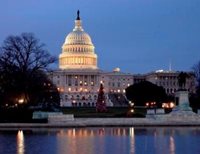
At the time of this writing, the U.S. Government is on hold, with only essential personnel at work and not getting paid. The FDA’s funding and functions have been impacted by the shutdown as well. Nearly 1 million FDA employees are furloughed or working without pay, meaning that review of drug applications, surveilling foodborne illnesses and monitoring disease outbreaks are slowed or diminished.
In case you missed this good news, at the eleventh hour of the 115th Congress, President Trump signed into law the Global Health Innovation Act (
H.R. 1660), long championed by GHTC (ASTMH is a member) to enhance transparency and oversight of USAID’s strategic engagement in health R&D. This is only one of two global health bills to make it out of the 115th Congress (the other was the reauthorization of PEPFAR). The bill directs USAID to report annually to Congress on its health R&D activities, progress, impact, and how the agency is working in coordination with other U.S. agencies and donors, and through public-private partnerships to maximize the effectiveness and efficiency of programs. The bill was introduced by Rep. Albio Sires (D-NJ) and Rep. Mario Diaz-Balart (R-FL) and has taken a decade to get passed.
Looking back to the start of the new Congress January 3, seven of the 12 funding bills for fiscal year 2019 (which began October 1, 2018) remain unfunded, including the State and Foreign Operations (SFOPs) bill that funds the Department of State and USAID. The funding bills are held up due to an impasse between the President and Congressional Democrats over $5.7 billion in funding for a U.S.-Mexico border wall. House Democrats passed four spending bills on January 9 that would fund non-immigration related agencies; President Trump has threatened to veto the bills, and as of this writing Senate Republicans are standing with the President and refuse to take up the spending bills until negotiations over the border wall are resolved.
On January 8, a bill was passed in the House that would reauthorize pandemic preparedness and national health security efforts within HHS (Pandemic and All-Hazards Preparedness and Advancing Innovation Act of 2019 (PAHPAI) (H.R. 269)). It has not moved in the Senate due to opposition by Sen. Richard Burr (R-NC) to portions of the bill unrelated to pandemic preparedness. Sen. Burr held up a similar bill at the end of Congress last year for the same reason.
Congressmen Gerry Connolly (D-VA) and Steve Chabot (R-OH) introduced the Global Health Security Act at the end of the last Congress. The bill seeks to address two main issues—that U.S. global health security staffing and activities are largely reliant on an executive order and not specifically supported in law, and that the U.S. needs a permanently designated official responsible for coordinating the interagency response to a global health security emergency. The bill will be reintroduced at some point in the new Congress. ASTMH sent a letter in support of the legislation.